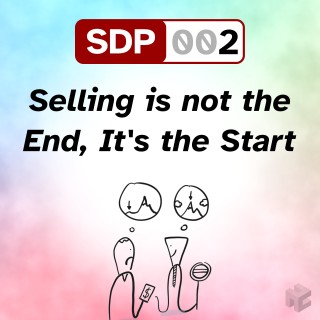Guy: Two
Guy: - selling is not the end. It's the start.
Guy: Welcome to the Service Design Principles. I'm Guy Martin,joined by the author of theI'm Guy Martin,joined by the author of the
Service Design Principles series of books. Founder of the Swiss Innovation Academy andFounder of the Swiss Innovation Academy and
Service Design Practitioner, the engaging, Daniele Catalanotto.Daniele Catalanotto.
Daniele: Hi Guy, such a pleasure to be here with you today.you today.
Guy: Same here, So each episode we're looking at one of the principles from your book, theone of the principles from your book, the
Service Design Principles. 1 to 100 and you know, the first book in the series. And today it's thethe first book in the series. And today it's the
second principle. Selling is not the end, it's the start. For many salespeople, once they'vethe start. For many salespeople, once they've
had the sale, they feel their job is done and now it's up to others to deliver. So why isn'tnow it's up to others to deliver. So why isn't
this true, Daniele?
Daniele: There is this exercise that I love to do, which is bringing back what we do indo, which is bringing back what we do in
business or in organizations to their everyday life. So imagine if you. You were dating. Youlife. So imagine if you. You were dating. You
know, and we are dating. And so basically when you're dating, you know, you go buy chocolates.you're dating, you know, you go buy chocolates.
You're inviting the person for drinks. You you give her flowers. You know, you say you tell hergive her flowers. You know, you say you tell her
how you're lovely and beautiful she is. And once you get married you stop, you know, basicallyyou get married you stop, you know, basically
you stop. It's like now you don't do anything. You never buy flowers again. You never tell herYou never buy flowers again. You never tell her
that she's beautiful in these skinny jeans. You know, you'd never say that. How would it feel,know, you'd never say that. How would it feel,
Guy: Not so good.
Daniele: No, And what would be the end? a divorce,divorce,
Guy: Very likely. Yep.
Daniele: And so. So basically, it's bringing it back to that level where if we do this kind ofback to that level where if we do this kind of
exercise, you know, a relationship between organizations and people, you know, ourorganizations and people, you know, our
basically relationship between people and people, that's how we think about it, you know, Andthat's how we think about it, you know, And
therefore what would be weird it down between individuals would be weird if we do it betweenindividuals would be weird if we do it between
organizations of people. So stopping at investing a lot only into marketing and notinvesting a lot only into marketing and not
thinking about, oh, we have to sustain that after this relationship, then basically you'reafter this relationship, then basically you're
you're planning for a divorce
Guy: Right.
Daniele: or a one night stand.
Guy: Which
Guy: . I mean, you can have one night stands in business senses as well. I suppose so. Maybebusiness senses as well. I suppose so. Maybe
that's not such a big issue for those particular services, butservices, but
Daniele: and I think that's that's where it's important is as long as people are clear andimportant is as long as people are clear and
it's you know, it's like in relationships, you know, when you when you're dating and you're inknow, when you when you're dating and you're in
relationships where you say, this is just fun and we're going to have a lovely night together,and we're going to have a lovely night together,
the expectation is clear,
Guy: Right.
Daniele: you know, But when we're saying, hey, you're lovely, we're speaking about kids andyou're lovely, we're speaking about kids and
stuff, and then once we've been in bed and then the next day I'm not here, that is that's athe next day I'm not here, that is that's a
broken relationship. if it's clear that it's a one night stand and then definitely it makesone night stand and then definitely it makes
sense. But I think many businesses today try to be to sell at least this idea that, oh, you'rebe to sell at least this idea that, oh, you're
going to have a long relationship with
Guy: Yeah.
Daniele: us.
Guy: So it's about setting expectations, right?
Daniele: Yeah, exactly.
Guy: Yeah. So I think especially, like, you know, the one night stand business, a single purchasethe one night stand business, a single purchase
may maybe you're in a foreign city or something, and you go to a kiosk, a bodega, a little storeand you go to a kiosk, a bodega, a little store
just to buy a bottle of water. That's
Daniele: Yeah,
Guy: that sort of one transaction that that's maybe the the whole-. Yes. The sale is the endmaybe the the whole-. Yes. The sale is the end
of the journey. But for services that are based on recurring revenue things like this, whereon recurring revenue things like this, where
people are constantly assessing and saying, do you live up to the expectations that you'veyou live up to the expectations that you've
already set, then the selling is setting the expectations and the delivery of those over time.expectations and the delivery of those over time.
That's that's the whole journey right?
Daniele: indeed. And even for the bodega, you know, if you go to go buy a water, if you justknow, if you go to go buy a water, if you just
feel that this guy made everything that you buy the water but isn't interested in you in any way,the water but isn't interested in you in any way,
Guy: Mm hmm.
Daniele: you know, next time you, you go next year back to that place, you definitely will notyear back to that place, you definitely will not
buy there because you will feel used. But if the guy sold you the thing and then just said, Hey,guy sold you the thing and then just said, Hey,
by the way, I've seen you, you've opened your map. There is a very cool place just to staresmap. There is a very cool place just to stares
from
Guy: Hmm.
Daniele: there. Nobody knows it. It's super great. What will you do? You go out, go downgreat. What will you do? You go out, go down
there, you come up and you go buy something new there for your kids because you said this guy isthere for your kids because you said this guy is
a super smart
Guy: Yeah.
Daniele: guy. He was lovely.
Guy: Yeah. So that's that's really interesting. We can turn that transactional experience intoWe can turn that transactional experience into
something that that could last longer. Even buying a bottle of water.buying a bottle of water.
Daniele: And even then. But obviously it it still makes sense to say that sometimes there isstill makes sense to say that sometimes there is
no need for that.
Guy: Right.
Daniele: But it doesn't mean it doesn't mean that it's always the case.that it's always the case.
Guy: Okay
Guy: . I think That's pretty clear. And this actually links into our our next principle asactually links into our our next principle as
well, which we'll talk about in the next episode. thanks, Daniele, again, and we'll speak againthanks, Daniele, again, and we'll speak again
then.
Daniele: Thank you.



